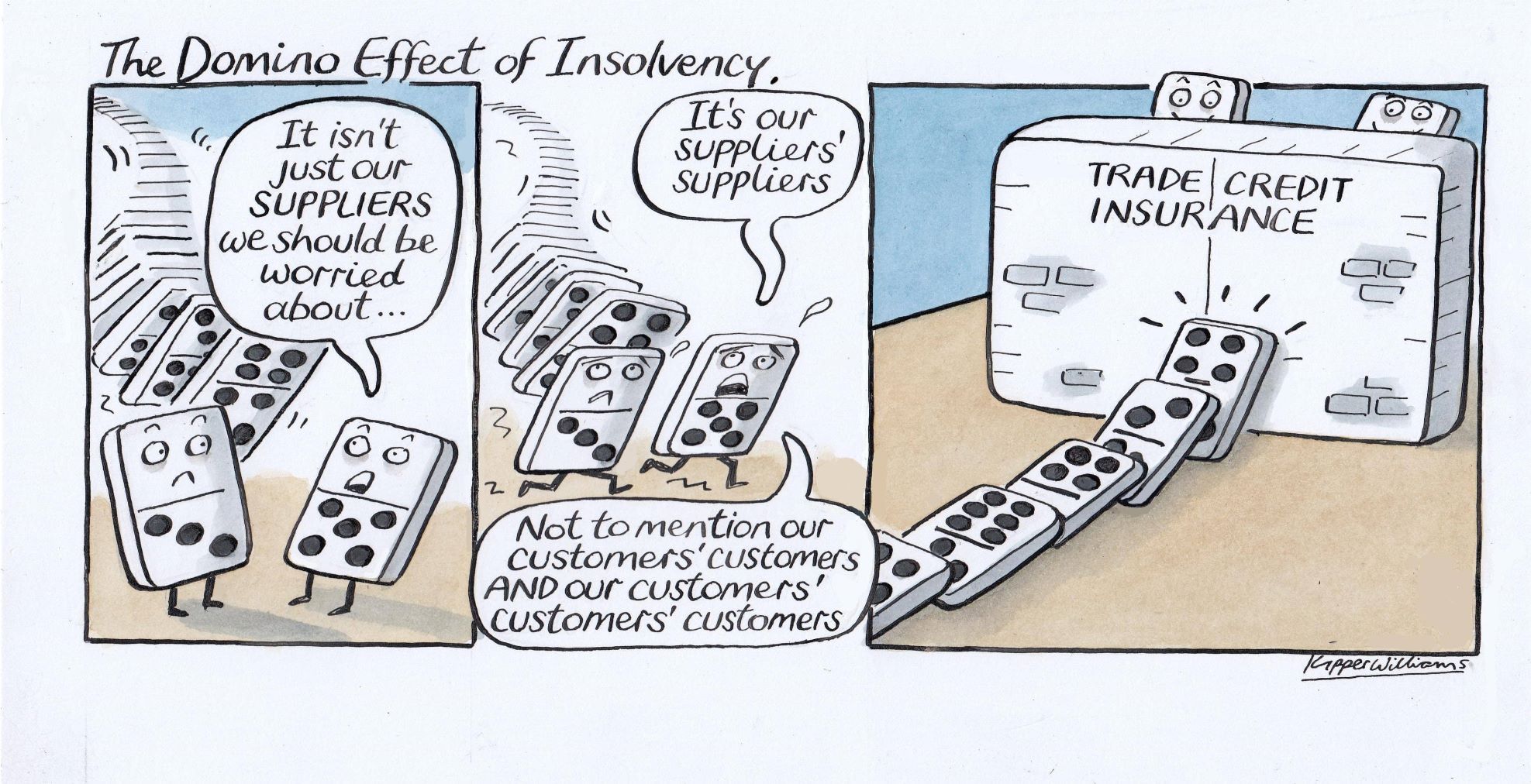
What is the domino effect of insolvency?
A single business failure can set off a series of other failures, just like a falling line of dominos. This means your firm can be hit by the collapse of a company you’ve never heard of, maybe even in another industry. This article explains how this insolvency domino happens - and how to protect against it.
Business failure: the good, the bad, and the unexpected
The domino effect can take many forms, and events such as rising inflation and prices, or the Ukraine crisis, can trigger the toppling of the first domino.
There are obvious problems if a customer goes bust. Will you get paid? How will you find new customers to replace them? Or if a supplier collapses, where will you get critical components or raw materials?
The major problems that can occur when a direct rival goes bust are less obvious. It may appear a positive development as you can enlarge your market share. But you may have shared suppliers. Some of these suppliers may collapse, or become zombie companies (i.e. continuing to operate, but unable to pay off their debt). Others may get nervous and start limiting credit, both of which will hit your cash flow.
Or you may have customers in common with the failed company, and the business failure may affect their behaviour. Perhaps they will reassess their supply chain, looking to diversify by looking at overseas suppliers. Or they may re-engineer their products, so the products you produce are no longer needed.
An example of the problems caused by the collapse of a direct competitor was the wave of energy company collapses in 2021. This was caused in large part, by structural problems in the market, but made worse by a domino effect.
The first wave of business failure triggered the collapse of a firm that supplied the UK with cheap gas from other parts of the world via special tankers. Surviving energy firms were forced to buy gas at short notice at higher prices - prices they were unable to pass on to customers and hastening, in some cases, their own demise.
Will your bank help with extra finance as you navigate through these issues? Maybe not. They may have seen another bank lose money on your (collapsed) competitor and are feeling jittery about the sector.
This is how the domino effect works. The failure of one company causes problems for rivals, suppliers and customers across industries. More firms may collapse. These new failures cause more problems and so the domino effect continues to ripple.
It’s very difficult to predict a domino effect
Then there are black swan events. This is when an industry is hit by a problem that no one could have predicted – and it doesn’t have to be as severe as Covid-19. For instance, entire industries may rely on a single component, a fact few will know until supply is disrupted.
In 2011, the global laptop and PC industry was heavily disrupted by flooding on an industrial estate in Thailand. Many of the factories that make the motors for disk drives were clustered in this one place. The closure of these plants triggered a devastating shortage of hard drives.
The domino effect meant some of the world’s largest PC and laptop firms couldn’t ship their products and this in turn affected sales of other processors, graphics chips and other components.
Another example is supermarket shelves emptying in 2021 due to the closure of a fertiliser plant on Teesside. Who knew most of the UK’s food-grade carbon dioxide was a by-product of fertiliser production at a single factory in Teesside? Very few - until that factory closed due to high energy prices. The result was disrupted production and higher prices for many food firms.
Tier 2 suppliers cause 30x the disruption of Tier 1 (direct) suppliers according to a Deloitte study in 2019.
The financial distress may not even be real. For example, rumours that a company can’t pay its bills can alter sentiment in the sector and cause a restriction in credit terms.
Which companies are at risk from the domino effect of business failure?
Most at risk are SMEs, who often have limited ability to carry out risk analysis and planning, as well as potentially limited working capital to serve as a buffer in the event of disruption. Any firm in an industry where customers or suppliers are heavily concentrated, or where there is a single point of failure in the industry’s supply chain, is also at risk.
Keeping track of a broad industry network was difficult before Covid-19. Now, it is even harder, as apparently stable businesses with a long trading history may have hidden problems. This could include excessive debt built up during the pandemic, or a business model that makes no sense in the changed business environment. This is the credit risk iceberg, with 90% of the risk hidden underneath the surface.
Carillion is a case in point. One of the UK’s largest construction firms, it collapsed in 2018 with 57 unfinished projects, including two hospitals, several major rail projects and the Aberdeen bypass.
There were warning signs that Carillion was in trouble. But the UK Government carried on issuing big contracts to the firm, creating a false sense of security and leading some in the supply chain to assume that Carillion was ‘too big to fail’. At the time of business failure Carillion owed around £2bn to 30,000 contractors and other creditors.
How can you mitigate the risk of business failure?
- Develop a balanced spread of customers. Be risk-aware. When talking to customers, ask how their business is going. Use Google Alerts or other tools to monitor them
- Plan: if your current suppliers went down, how would you secure alternative supplies?
- Watch days sales outstanding (DSO) closely. Is a major customer that usually pays promptly becoming slower to pay? Try and find out why
- Understand your supply chain. Do you buy components from multiple firms that use a single supplier for key parts? Find a supplier with an independent supply network
- Look into Trade credit insurance
How can Allianz Trade help to protect you against the domino effect?
Uncovering risk is never easy. Firms in financial trouble don’t broadcast it. And the first domino to fall may be a firm you’ve never heard about, on another continent.
Did you know that accounts receivable represent 40% of the average UK company’s assets? Are yours properly protected? Trade credit insurance means that if, for any reason, your customer defaults on payment, or delays payment in such a way that it prejudices your company’s ability to function, we step in to cover your exposure.
As an Allianz Trade client, we work with you as a team, providing access to our predictive intelligence. We monitor over 85 million companies worldwide, as well as global trends, sector-specific risks, political developments, and problems in the pipeline. We carry out rigorous checks to ensure the creditworthiness of your customers - and your customers’ customers. Day in, day out, it’s what we do. All this in addition to providing trade credit insurance.
What are the other advantages of trade credit insurance?
Many firms regard trade credit insurance not a cost but as a strategic investment. It can not only protect you from the domino effect, but also allow you to capitalise on disruption.
A realignment of an industry due to a failure may mean you win new customers - but this can be a moment of danger. Before you invest time, energy, and money in a new sector, or export market, as an Allianz Trade client you benefit from our predictive intelligence.
With confidence that your new customers are sound, you can move to swiftly increase order volumes. This is why many firms regard trade credit insurance as essential not only for protection, but to power growth.
Read about how trade credit insurance can help your firm.
